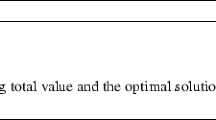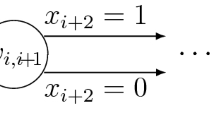Abstract
A specialization of the dual simplex method is developed for solving the linear programming (LP) knapsack problem subject to generalized upper bound (GUB) constraints. The LP/GUB knapsack problem is of interest both for solving more general LP problems by the dual simplex method, and for applying surrogate constraint strategies to the solution of 0–1 “Multiple Choice” integer programming problems. We provide computational bounds for our method of o(n logn), wheren is the total number of problem variables. These bounds reduce the previous best estimate of the order of complexity of the LP/GUB knapsack problem (due to Witzgall) and provide connections to computational bounds for the ordinary knapsack problem.
We further provide a variant of our method which has only slightly inferior worst case bounds, yet which is ideally suited to solving integer multiple choice problems due to its ability to post-optimize while retaining variables otherwise weeded out by convex dominance criteria.
Similar content being viewed by others
References
E. Balas and E. Zemel, “Solving large 0–1 knapsack problems”, Management Sciences Report 408, Graduate School of Industrial Administration, Carnegie-Mellon University, Pittsburgh (1976), revised July 1977).
R. Barr and G.T. Ross, “A linked list data structure for a binary knapsack algorithm”, Research Report CCS 232, Center for Cybernetic Studies, The University of Texas at Austin (1975).
E. Beale and J. Tomlin, “Special facilities in a general mathematical programming system for non-convex problems using special ordered sets of variables”, in:Proceedings of the 5th IFORS conference (London, 1970) 447–454.
E. Beale and J. Tomlin, “An integer programming approach to a class of combinatorial problems”,Mathematical Programming 3 (3) (1972) 339–344.
D. Fayard and G. Plateau, “Resolution of the 0–1 knapsack problem: comparison of methods”,Mathematical Programming 8 (3) (1975) 272–307.
F. Glover, “Convexity cuts for multiple choice problems”,Discrete Mathematics 6 (1973) 221–234.
F. Glover, “Surrogate constraint duality in mathematical programming”,Operations Research 23 (1975) 434–451.
F. Glover and D. Klingman, “Network applications in industry and government”,AIIE Transactions 9 (4) (1977) 363–376.
H. Greenberg and R. Hegerick, “A branch search algorithm for the knapsack problems”,Management Science 16 (1970) 327–332.
H. Greenberg and W. Pierskalla, “Surrogate mathematical programming”,Operations Research 18 (1970) 924–939.
D. Gross and C. Pinkus, “Optimal allocation of ships to yards for regular overhauls”, Technical Report 63095, George Washington University, Washington, DC (1972).
D. Klingman, G.T. Ross and R. Soland, “Optimal lot-sizing and machine loading for multiple products”, in:Proceedings of the conference on the disaggregation problem, Ohio State University (Columbus, 1977).
E. Masud, “An interactive procedure for sizing and timing distribution substations using optimization techniques”, Paper T75 142-6, presented at the IEEE PES Winter Meeting (New York, 1974).
R. Nauss, “The 0–1 knapsack problem with multiple choice constraints”, Working Paper, University of Missouri (St. Louis, 1975, revised May 1976).
P. Sinha and A. Zoltners, “The multiple choice knapsack problem”,Operations Research (to appear).
C. Witzgall, “On one-row linear programs”,Extremal methods and systems analysis symposium volume (Springer, New York, to appear).
E. Zemel, “Conversion of LP/GUB knapsack problems into LP knapsack problems”, Working paper, Graduate School of Management, Northwestern University, Illinois (1978).
Author information
Authors and Affiliations
Rights and permissions
About this article
Cite this article
Glover, F., Klingman, D. A o(n logn) algorithm for LP knapsacks with GUB constraints. Mathematical Programming 17, 345–361 (1979). https://doi.org/10.1007/BF01588255
Received:
Revised:
Issue Date:
DOI: https://doi.org/10.1007/BF01588255




